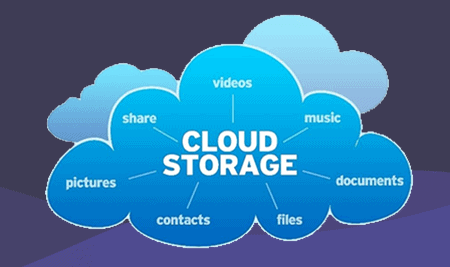The cloud is here to stay. It’s already one of the best ways to backup and store data, but cloud storage, like most things, has a list of pros and cons that are worth considering. It’s rare to find a use case where cloud storage shouldn’t play a role in the backup process, whether it’s the sole method or part of a bigger strategy, but those use cases do exist…
For instance, if security is your absolute number one priority, it would probably make more sense to use multiple physical backup locations, with safes, and encrypted hard drives at that can’t be used independently from one another (a hybrid cloud).
[displayAd]
In order to suffer data theft in this scenario, someone would need to break into multiple locations, crack multiple safes, and do this all before you noticed. You could even have the decryption key on a USB stick that you wear around your neck for the cherry on top.
But that’s a little over the top for most of us, so we’re going to take a more practical look at it.

We’ve only just begun to scratch the surface, so let’s dig deeper into the pros and cons of cloud storage and why they may (or may not) matter in your specific use case.
Pros of Cloud Storage
Here’s a look at the pros of using the cloud for your data storage, both on its own or as an alternative to other methods. Ideally, you’ll combine the power of the cloud with traditional storage methods for an even stronger solution.
Instant Setup
You can sign up with one of the best cloud storage companies right now and begin uploading your data immediately. Granted, there will be some delay for the time it takes to transfer, depending on how much data you have, but generally speaking you’re ready to roll within minutes of signing up.
After signing up, you’ll download the client for the service you choose, which will function similarly to any other folder on your computer or app on your mobile device or tablet. You’ll add the files you want to backup/store into that folder, and they’ll automatically sync with your cloud account. In this case, you’ll have a local version of them and a cloud version.
You can opt-out of storing the files on your own computer, but that’s generally not the best idea unless you’re short on space, which is the main reason most people end up with cloud storage accounts: they want to store photos and also some documents to pass around from computer to computer.
Relatively Secure for the Average User
You’ll notice I’m phrasing this section carefully. Everybody knows that nothing online is 100% secure, but for the typical average user who is backing up vacation photos and what-not, someone who isn’t a specific target of hackers, then cloud storage can be considered safe and secure as long as you’re following general best-practices to keep your computer and passwords safe.
Relative to setting up your own web server to store things yourself, or keeping the files on any network-connected drive in your home, it stands to reason that billion-dollar internet infrastructure companies are going to have better data-protection than you or me. Of course, they’re higher profile and more prone to being attacked, too, but they also have geniuses working around the clock to keep your data safe and have software monitoring capabilities.
Ease of Use
Compared to running your own off-site data backup scheme, the cloud is super easy to use. Drag over the files you want to backup, and that’s it. Most providers will automatically sync any changes that you make instantly, but you can also turn this off if you’d like to take a slightly more manual approach. In any case, in terms of pure ease of use, cloud is by far the winner no matter how you slice it.
The simplicity of dragging a file into a folder, and instantly having an off-site backup that you can access from any of your devices, is unparallelled.
Access to Your Data
To follow up on the previous point, once your files are uploaded to the cloud, you can access them from your desktop, from your cellphone or table, and from any other computer that has a web browser. This is perfect for travelling, or just if you’re at a friends house and wanted to show them something. It’s also useful for transferring files from one computer to another.
[displayAd]
Low Start-Up Cost
Cloud storage is either billed on a pay-per-use basis or divided into tiers, so you can get started for next to nothing until your storage needs grow, and then the price will increase accordingly. It makes it very easy to predict your backup expenses, compared to managing all of this yourself, buying drives, replacing them as the fail, and so on.
Most cloud storage companies offer some type of a free plan, too, so you can take them for a test-drive first. Even if you settle on one that doesn’t, the monthly fees are likely low enough that you can try out multiple options before settling on something.
Ease to Scale
When you run out of storage space, you don’t need to rush out and order new drives or anything of the sort. Simply upgrade your plan, and you’ll have more space available to you instantly.
Cons of Cloud Storage
It’s not all sunshine and rainbows, there are some downsides to cloud storage that are worth keeping in mind. In most cases, these won’t really matter, so that’s a plus… but if any of these are deal-breakers for you, you’ll be glad you found out about them now instead of later.
Requires Internet Access
When you rely on the cloud to store your files, and you aren’t keeping a local copy, then you simply won’t be able to access them without internet access. You need an active connection to the internet in order to download or access any of the files that you keep hosted on the cloud.
Keep in mind that if you have a mobile connection that can be good enough, but you can quickly go over your bandwidth limits if you use it as a hotspot or download too many high-resolution images at once, especially if you have it set up to automatically sync. Many know not to sync unless they detect a wifi signal, though.
You Don’t Have Physical Control Over It
You’re relying on someone else to run the data center and you’re trusting that they’re doing that correctly. We’re usually talking about huge-scale operations here, so it’s not typically a concern, but it’s definitely not a plus (except for the fact that they handle all aspects of maintaining a data center, securing it, having backup generators in case the electricity cuts out, and all of the things you might not think about).
Security Concerns for High-Profile Users
Celebrities and billionaires may not feel totally comfortable keeping their data in the cloud, especially after some of the data breaches and leaks that have been very public. This isn’t a huge concern for the average person, because they aren’t targets in the same way and generally know to use secure passwords.
Vendor Lock-in
It’s not always easy to move from one provider to another if your cloud needs change down the road, and this is especially true when you have a ton of space. Let’s say that you have 10tb of files stored in your cloud account, and you want to move to a new cloud storage company…
Rather than just transfer it from one to the other, you’ll may need to download these files yourself, first. If you only have a 500gb or 1tb harddrive, this will have to be done a little bit at a time. Many do have cloud storage migration tools for other providers, especially the most popular options.
[displayAd]
In Other Words, Cloud Storage is Great
There’s no great reason to avoid using one of these services. The convenience is astronomical and it off-site storage is a critical part of a redundant backup solution. If you aren’t doing that, you aren’t fully secure. If you’re interested, don’t wait because your data and files are at risk until you have several backups with at least one being off-site in a secure location.
Though we’ve described the pros and cons of cloud storage, you still may not be clear on exactly what cloud storage is in any depth. No fear, we’ve got you covered. The benefits of cloud storage are clear, and if you’re already interested then it’s a perfect choice for you. Just take the time to understand it and get comfortable, then take care of business.
